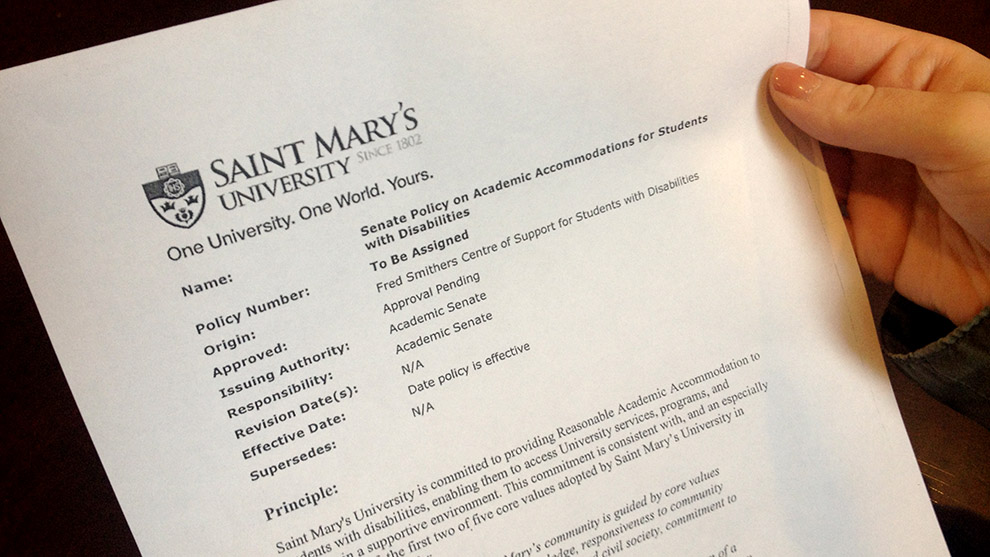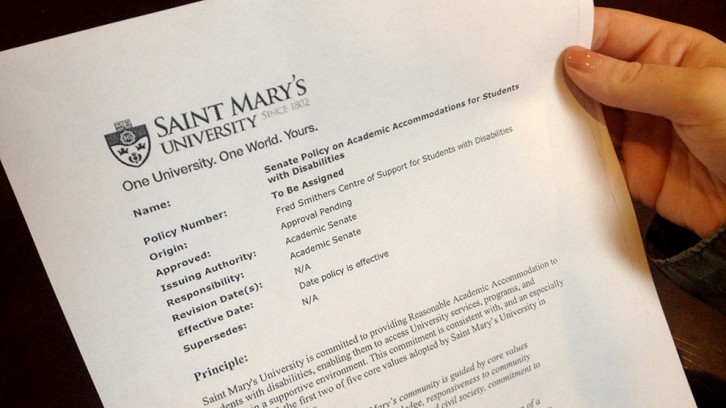Disabilities
SMU begins work on disability policy
Saint Mary’s University’s academic senate started discussion on a policy for students with disabilities. SMU is one of a small number of universities in Canada without such a policy.

caption

caption
The policy draft is still in the beginning stagesThe academic senate at Saint Mary’s University reviewed a policy draft last week concerning academic accommodations for students with disabilities, with one member hoping to broaden the scope of the policy to include non-academic events.
David Leitch, director at the Smithers Centre of Support for Students with Disabilities at Saint Mary’s University, presented a discussion draft of the policy at a senate meeting on Oct. 9.
Leitch said the policy is “long overdue,” adding that most universities in Canada already have an accommodations policy for students with a physical or mental disability.
Dalhousie, Mount Saint Vincent, NSCAD and the Nova Scotia Community College all have an accommodation policy.
“I think it’s good for the university, it’s good for faculty and administrators,” said Leitch in the meeting. “It’s also good for the students to have something to refer to if they feel their rights are being denied or they’re not being welcomed into the community.”
Concerns
A member of the senate raised concerns about the policy draft as it does not cover non-academic events on campus, such as events held by the Saint Mary’s University Student Association.
The member stated that, while these events are not academic, they are important to the university experience.
Leitch responded, saying such an addition would require more discussion.
“We don’t know where those boundaries are and who would be responsible for access to those kinds of events,” said Leitch in the meeting. “They might be doing something related to their studies or it might also be a party.”
Policy draft breakdown
The policy draft was adapted from Memorial University of Newfoundland’s policy: “Academic Accommodations for Students with Disabilities.”
The policy draft aims to aid students with disabilities through “integration and full participation in a course or classroom,” the document states.
The university wouldn’t be able to deny students admission based on a disability, however, the policy draft states that admission does not guarantee accommodation for course work.
Students are required to provide necessary documentation to the Smithers Centre from a doctor, psychologist, audiologist, or other health-care professional, that relates a “detailed explanation of the functional impact of the disability on the pursuit of post-secondary education.”
Leitch said in the meeting that “half the job is with the students and half the job is with the faculty.”
Under the policy draft, professors and faculty would be responsible for appropriate classroom and learning accommodations.
The policy draft states that students who are “reasonably accommodated” and do not meet “established institutional standards” may be denied entry into a program of study, or denied “continued participation in the program.”
The university would be able to claim undue hardship if there is significant financial strain or difficulty, such as:
- A risk to public safety or personal safety of the students
- Impeding other students’ ability to learn
- Altering of substantial program requirements
The draft will undergo review by the university’s lawyer as well as additional revisions before being brought before the senate again.

